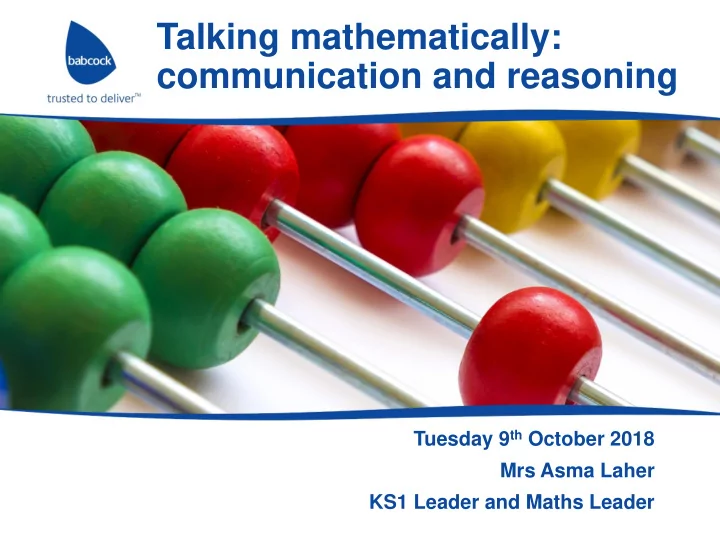

Talking mathematically: communication and reasoning Tuesday 9 th October 2018 Mrs Asma Laher KS1 Leader and Maths Leader
Aims • Understand what reasoning ‘is’ and why it is so important to secure mathematical understanding. • Share practical classroom strategies to promote and embed maths talk and reasoning across KS1. • Explore ways in which reasoning can become part of day-to-day teaching. www.babcock.co.uk
National Curriculum www.babcock.co.uk
Developing Discussion Partner Talk Sentence starters to help children construct their argument Time for children to improve their expression Teacher modelling mathematical talk www.babcock.co.uk
Sentence Starters to support reasoning and explanation www.babcock.co.uk
www.babcock.co.uk
Mathematical Talk • • Spot the mistake / Which is correct? Is he right or wrong? Prove it. • • What else do you know? / Why? True or false? • Fact families If you know. . . What • What comes next? else do you know? • Do, then explain • Convince me / Prove it / Generalising • / Explain thinking Make up an example / Write more • Can you use apparatus/ draw a statements / Create a question / picture/ write a calculation to prove Another and another your answer? • Possible answers / Other possibilities • Make an estimate / Size of an answer • • What do you notice? Discuss with your partner. Are they always, sometimes or never true? • Complete the pattern / Continue the Make sure you give examples. pattern • Can you find? • Missing numbers / Missing symbols / • What’s the same, what’s different? Missing information/Connected • Which is the odd one out? Why? calculations • Another and another • • If this is the answer, what’s the Working backwards / Use the inverse question? / Undoing / Unpicking www.babcock.co.uk
Assessment Notes www.babcock.co.uk
Getting Terminology Right www.babcock.co.uk
Maths Working Walls www.babcock.co.uk
White Rose Hub Planning www.babcock.co.uk
Marking and Feedback www.babcock.co.uk
www.babcock.co.uk
What What do you How are information do need to find you going to you have? out or do? tackle this? Encourage children to get started What What questions What operation/s are will you need to equipment will you going to ask? you need? use? Will you do it How are you What do you mentally, with pencil going to record think the answer and paper, using a what you are or result will be? number line? Why? doing?
www.babcock.co.uk
Can you explain Why did you What else is what you have decide to use there to do? done so far? this method or do it this way? Make positive interventions – encourage perseverance Can you think of Do you think What did you another method that this would notice that might have work with other when…? worked? numbers? Have you thought of Why did you Are you all the possibilities? decide to beginning to see How can you be organise your a pattern or a sure? results like that? rule?
www.babcock.co.uk
Can you Can you talk me What did you do describe the through what last time? problem in your you have done What is different own words? so far? this time? Stuck pupils - encourage perseverance Is there something Could you try it with What about simpler numbers… that you already putting things fewer numbers… know that might using a number in order? help? line…? Would a table Why not make a Have you help, or a guess and compared your picture, diagram check if it work with anyone else’s? or graph? works?
www.babcock.co.uk
What are the key How did you What could points or ideas that get your you try you need to remember for the next answer? next? lesson? Draw conclusions Can you What have you Would it work describe your learned or found with different method/pattern/ out today? numbers? rule to us all? Is it a reasonable If you were Can you answer/result? doing it again, explain why it How did you what would you works? check it? do differently?
Challenging the More Able www.babcock.co.uk
Mathematical Reasoning • Pupils understand core concepts and make connections. • Think more critically about their work, justifying their answers. • Give reasons for their answers. • Find patterns and relationships. • Develop an argument and provide proof. • Explain mathematical thinking. • They think for themselves. • Persevere with challenges, knowing they will succeed. • They embrace the value of learning from mistakes and false starts. • They reason, generalise and make sense of solutions. • Use mathematical language . www.babcock.co.uk
Where to go for ideas? • National Curriculum • Maths white rose hub planning • Teaching for Mastery booklet • NCETM - progression in reasoning • NCETM – National Curriculum tools and videos • NRICH • Maths Vocabulary www.babcock.co.uk
www.babcock.co.uk
alaher@hurst-park.surrey.sch.uk
Recommend
More recommend